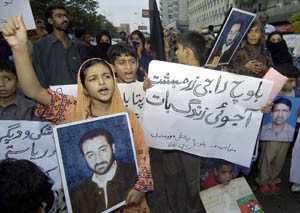Balochistan: One Province, Two Wars

Pakistani missing persons families hold pictures of their missing people as they staged a demonstration in Karachi 10 December 2007. Scores of individuals and civil liberty groups observe the International Human Rights Day in Pakistan terming it the ‘black day’ due to imposition of emergency in the nuclear-armed South Asian nation. AFP PHOTO/ Asif HASSAN[/caption]
Abdul Ghaffar Lango, an activist for Baloch nationalism, was abducted right in front of his wife on December 11, 2009.
When his abduction was reported, the police told his family that he had been detained because of his political activities. Seven months later, his body was found covered with marks of brutal torture. It was a poignant symbol of the cruelty being inflicted on the Baloch population.
Global non-governmental organisation Human Rights Watch (HRW) released a report on the role of Pakistani security forces in the disappearance of Baloch nationalists on July 28, 2011. “We Can Torture, Kill, or Keep You for Years” documents how the authorities have, since 2005, taken hundreds of people into custody without cause, ignoring their families’ pleas for information. “The government agencies that HRW found to be most involved in enforced disappearances in Balochistan are Military Intelligence (MI), the Frontier Corps (FC) and, to a lesser extent, the Directorate for Inter-Services Intelligence (ISI) and the Intelligence Bureau (IB),” states the report.
The HRW report is based on over 100 interviews with the family members of missing people, lawyers who’ve fought for their release, witnesses to abductions, human rights activists and former detainees. Such a scope allows the report to include many detailed accounts of horrifying “disappearance” cases. HRW found that most of the people abducted have been men associated with Baloch nationalist parties and movements, and that often the kidnappers “beat the victims and dragged them handcuffed and blindfolded into their vehicles.” When not alone, victims have been beaten on the spot while those around them (sometimes family, the elderly and the sick) are held at gunpoint.
One man recalls his time in a detention facility this way:
“They beat me all over my body and on the soles of my feet with their fists and feet. They hit me for around one to two hours continuously in the morning, then again in the evening. At night they would not let me sleep or lie down, I was forced to stand. If I started to fall asleep they would hit me on the back and shoulders to keep me awake.”
HRW has supported the allegations levelled at official intelligence and security agencies in many ways, but this paragraph sums up the situation for most of the “enforced disappearances” it has examined:
“In 31 of the cases documented by Human Rights Watch, witnesses described the perpetrators as armed men in civilian clothes, typically arriving in one or more four-door pickup trucks. The witnesses usually referred to these perpetrators as members of the “agencies” because of the circumstances of the abductions — often perpetrated openly in broad daylight, with the assistance of the police or FC personnel, in areas only readily accessible by security personnel. These suspicions of state responsibility were often then corroborated by information about their relatives’ whereabouts they managed to obtain after the disappearance.”
However, the military is not the only perpetrator of violence in the troubled province. Armed assailants, the HRW reveals, have now taken to attacking non-Baloch civilians. As the Baloch are made to feel more and more vulnerable because of their ethnicity, they are clearly becoming defensive and lashing out against those who belong to other ethnic groups.
Much as we urban-dwellers try to ignore — until we need to use the plight of the oppressed province to pad our anti-government rants — Balochistan is as much a part of our country as any other province. As Brad Adams, Asia director of HRW, succinctly puts it: “All Pakistanis will pay the price if the government fails to protect Balochistan’s population from heinous abuses at the hands of the Pakistani military.” You might “disappear” next.
To read the report, including all the 45 cases it has documented, the incredibly detailed recommendations as well as separate letters addressed to Balochistan Chief Minister Nawab Aslam Raisani and Prime Minister Yousuf Raza Gilani, please click here.



